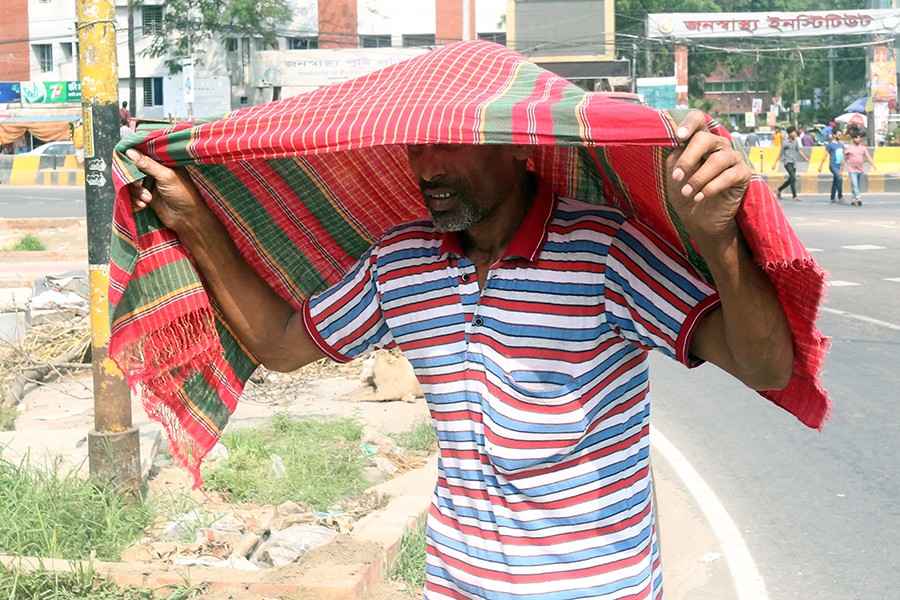Dhaka's Temp Rises 6°C In a Decade
Bangladesh may be among worst sufferers of heat stress

Published :
Updated :

Bangladesh may become one of the worst sufferers of heat stress, as Dhaka's temperature has risen by nearly 6°C over the last decade, far exceeding the global threshold of 1.5°C, experts warned.
The economic losses due to heat is projected to increase to US$2,400 billion in 2030, with the impact of heat stress being most pronounced in lower-middle- and low-income countries, experts in Belem of Brazil said Thursday.
Heatwave frequency has been projected to more than twice by 2050, with little night time relief, they said.
Nature Conservation Management (NACOM) and Dhaka North City Corporation (DNCC) jointly organised the discussion as a side event of the COP30 conference.
Fisheries and Livestock Adviser Farida Akhter was the chief guest at the event where executive director of NACOM, Munjurul Hannan Khan delivered a keynote paper presentation titled, "Heat Stress in Dhaka: An urgent examination of rising temperatures, vulnerable populations, and pathways to resilience in South Asia's megacity."
Heatwave is a growing threat not only for Bangladesh but the world as well, said the adviser.
She stressed for expanding greeneries and ensuring availability of potable water to help reduce the risks during heatwaves.
Bangladesh has been the pioneer in the world in executing early warnings for natural disasters like cyclones and floods, said head of the secretariat of the Risk-informed Early Action Partnership (REAP) Dr Catalina Jaime.
There should be equal rights and economic justice for the people across the world whether they are poor or the rich, said Equal Right's regional campaign manager for the Asia Pacific Zainab Bie.
Dhaka stands at a critical crossroads, the discussants noted, adding that escalating heat stress threatens millions' health and economic security.
Yet local innovation combined with international support can transform vulnerability into resilience, they added.
Governments, communities, and international partners together can safeguard Dhaka's future against the growing heat threat, the discussants said.
Urban expansion, deforestation, and shrinking green spaces exacerbate temperature rise, they said.
Global heat extremes are intensifying worldwide, with heatwaves becoming increasingly common, they said, adding that over 1.0 billion people in cities face heat stress, with low-income communities disproportionately affected.
Heat stress causes exhaustion, heatstroke, and increased mortality, especially among informal workers.
Dense population and corrugated iron roofs cause districts like Kamrangirchar to reach temperatures up to 12°C hotter than surrounding areas.
Street vendors, garment workers, and rickshaw pullers face prolonged exposure without shade or cooling, risking dehydration and heatstroke.
River erosion, Flood-displaced migrants live in overcrowded tin-roofed slums with poor ventilation, intensifying heat stress impacts.
Pregnant women face increased risks of preterm birth linked to heatwaves; marginalised communities bear disproportionate burdens.
For heat stress mitigation, the discussants opined that green infrastructure can reduce surface temperatures by up to 3°C, especially in informal settlements.
Implement shaded rest areas, flexible work hours, and hydration access for informal workers, can also be effective.
Deploying forecast-based financing to trigger timely heatwave responses and protective action is also necessary.
Promoting affordable materials and ventilation improvements to reduce indoor heat exposure is also necessary, they added.
In a separate discussion, experts called for transparency, fairness, and green growth in carbon markets under the Paris Agreement.
The session titled "Article 6 of the Paris Agreement: Pathways for Emission Reduction" was held at the Bangladesh Pavilion during the 30th United Nations Climate Change Conference (COP30) in Belém, Brazil.
The event was chaired by Mohammad Navid Shafiullah, Additional Secretary of the Ministry of Environment, Forest and Climate Change, and attended by Farida Akhtar, Adviser to the Ministry of Fisheries and Livestock, as the Chief Guest.
Professor Dr. Ahmad Kamruzzaman Majumder, Dean of the Faculty of Science at Stamford University Bangladesh and Chairman of the Center for Atmospheric Pollution Studies (CAPS), presented the keynote paper, while Md. Ziaul Haque, Additional Director General of the Department of Environment (DoE), moderated the session.
azizjst@yahoo.com


 For all latest news, follow The Financial Express Google News channel.
For all latest news, follow The Financial Express Google News channel.